word完整版小升初四大时态及习题
小学四大时态练习(打印版)
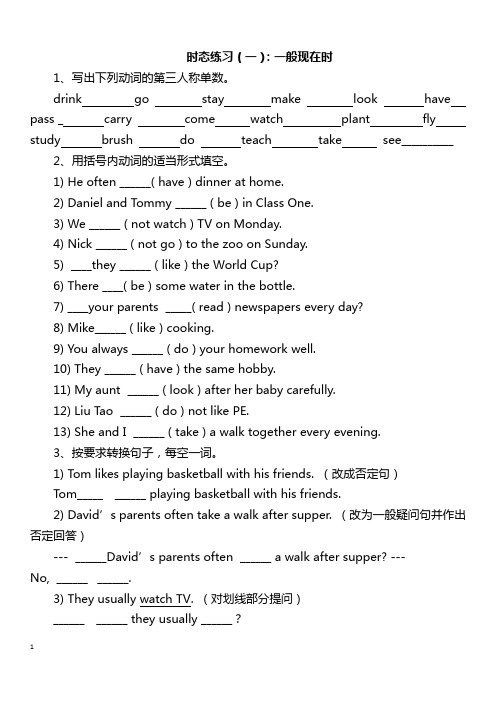
时态练习(一):一般现在时1、写出下列动词的第三人称单数。
drink go stay make look have pass _ carry come watch plant fly study brush do teach take see__________2、用括号内动词的适当形式填空。
1) He often ______( have ) dinner at home.2) Daniel and Tommy ______ ( be ) in Class One.3) We ______ ( not watch ) TV on Monday.4) Nick ______ ( not go ) to the zoo on Sunday.5) ____they ______ ( like ) the World Cup?6) There ____( be ) some water in the bottle.7) ____your parents _____( read ) newspapers every day?8) Mike______ ( like ) cooking.9) You always ______ ( do ) your homework well.10) They ______ ( have ) the same hobby.11) My aunt ______ ( look ) after her baby carefully.12) Liu Tao ______ ( do ) not like PE.13) She and I ______ ( take ) a walk together every evening.3、按要求转换句子,每空一词。
1) Tom likes playing basketball with his friends. (改成否定句)Tom_____ ______ playing basketball with his friends.2) David’s parents often take a walk after supper. (改为一般疑问句并作出否定回答)--- ______David’s parents often ______ a walk after supper? ---No, ______ ______.3) They usually watch TV. (对划线部分提问)______ ______ they usually ______?4)She is always a good student. (改为一般疑问句并作出肯定回答)5)--- ___ ______ always a ______ student? --- ______ , ______ ______ .6)5) Simon and Daniel like going skating. (改为否定句)7)Simon and Daniel ______ ______ going ______.6)Tom does his homework every day.(否定句)Tom_________ ______ his homework every day.7)Alice has got a new comic book as her birthday present.(改为一般疑问句并肯定回答)_________ Alice___________ a new comic book as her birthday presentYes, _______ _________.时态练习(二):一般将来时一、用所给动词的正确形式填空。
小升初英语四大时态复习讲解及真题专项练习含答案
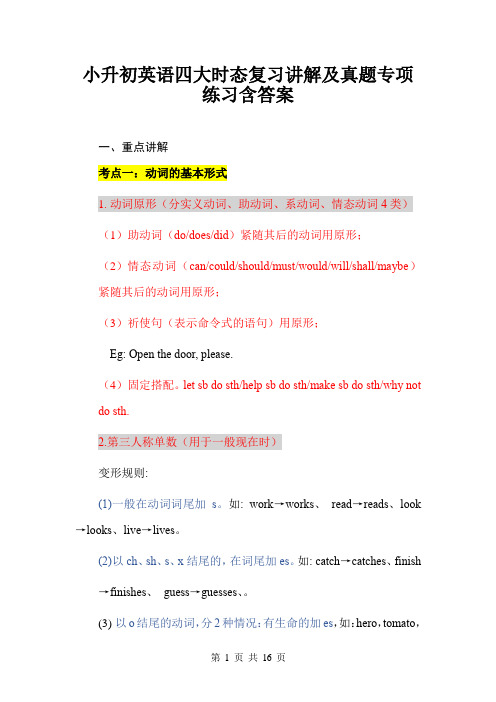
小升初英语四大时态复习讲解及真题专项练习含答案一、重点讲解考点一:动词的基本形式1.动词原形(分实义动词、助动词、系动词、情态动词4类)(1)助动词(do/does/did)紧随其后的动词用原形;(2)情态动词(can/could/should/must/would/will/shall/maybe)紧随其后的动词用原形;(3)祈使句(表示命令式的语句)用原形;Eg: Open the door, please.(4)固定搭配。
let sb do sth/help sb do sth/make sb do sth/why not do sth.2.第三人称单数(用于一般现在时)变形规则:(1)一般在动词词尾加s。
如: work→works、read→reads、look →looks、live→lives。
(2)以ch、sh、s、x结尾的,在词尾加es。
如: catch→catches、finish→finishes、guess→guesses、。
(3)以o结尾的动词,分2种情况:有生命的加es,如:hero,tomato,potato;没有生命的加s,如:radio,photo。
(4)以辅音字母加y结尾的动词,变y为ies。
如: fly→flies、study →studies、carry→carries.(5) 不规则变化。
如: have→has ,are→is,were→was3.现在分词(用于现在进行时)变形规则:(1)一般在动词后加ing。
如: work→working、read→reading、look →looking、wait→waiting。
(2)以不发音的e结尾的动词,去掉e,再加ing。
如: smile→smiling、move→moving、take→taking、write→writing。
(3)以重读闭音节结尾的且词尾只有一个辅音字母的,双写这个辅音字母加ing。
如: sit→sitting、stop→stopping、cut→cutting、run →running、swim→swimming.(4)少数几个以ie结尾的动词,将ie改为y加ing。
四种时态及其练习(完整版)
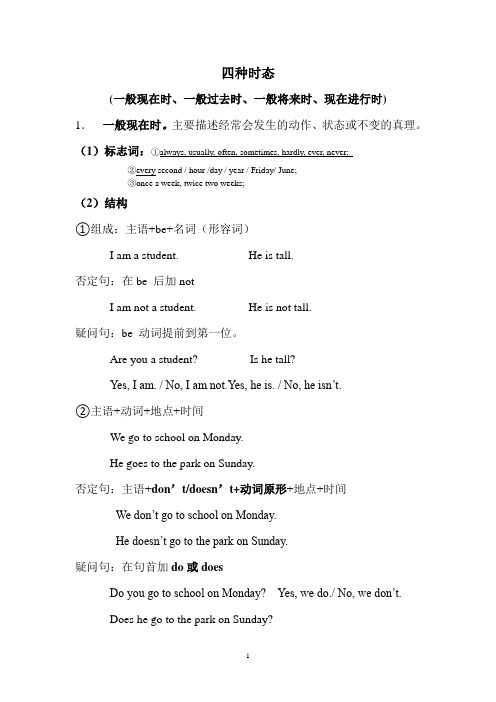
四种时态(一般现在时、一般过去时、一般将来时、现在进行时)1.一般现在时。
主要描述经常会发生的动作、状态或不变的真理。
(1)标志词:①always, usually, often, sometimes, hardly, ever, never;②every second / hour /day / year / Friday/ June;③once a week, twice two weeks;(2)结构①组成:主语+be+名词(形容词)I am a student. He is tall.否定句:在be 后加notI am not a student. He is not tall.疑问句:be 动词提前到第一位。
Are you a student? Is he tall?Yes, I am. / No, I am not.Yes, he is. / No, he isn’t.②主语+动词+地点+时间We go to school on Monday.He goes to the park on Sunday.否定句:主语+don’t/doesn’t+动词原形+地点+时间We don’t go to school on Monday.He doesn’t go to the park on Sunday.疑问句:在句首加do或doesDo you go to school on Monday? Yes, we do./ No, we don’t.Does he go to the park on Sunday?Yes, he does./ No, he doesn’t.(3)动词三单变化:①在原单词末尾加s , 如:like –likes②单词以o, sh, ch, s, x 结尾加es, 如:go –goes③单词末尾为辅音+y结尾去y加ies 如:study- studies2. 现在进行时:主要叙述正在发生的事情。
(完整版)四大时态综合练习(可编辑修改word版)
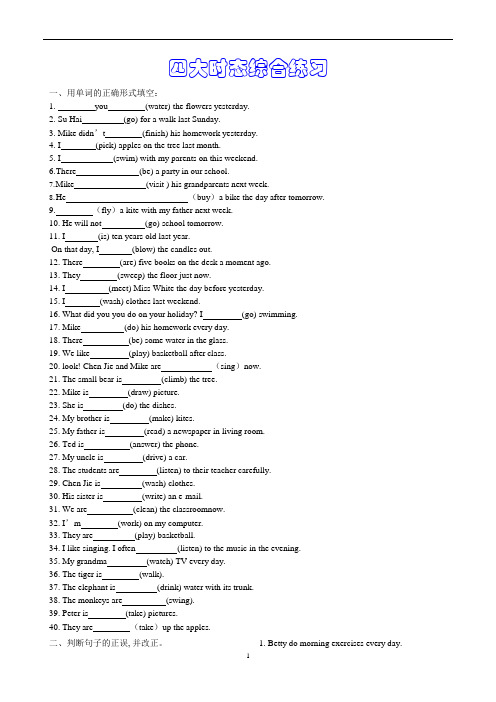
四大时态综合练习一、用单词的正确形式填空:1.you (water) the flowers yesterday.2.Su Hai (go) for a walk last Sunday.3.Mike didn’t (finish) his homework yesterday.4.I (pick) apples on the tree last month.5.I (swim) with my parents on this weekend.6.There (be) a party in our school.7.M ike (visit ) his grandparents next week.8.H e (buy)a bike the day after tomorrow.9. (fly)a kite with my father next week.10.He will not (go) school tomorrow.11.I (is) ten years old last year.On that day, I (blow) the candles out.12.There (are) five books on the desk a moment ago.13.They (sweep) the floor just now.14.I (meet) Miss White the day before yesterday.15.I (wash) clothes last weekend.16.What did you you do on your holiday? I (go) swimming.17.Mike (do) his homework every day.18.There (be) some water in the glass.19.We like (play) basketball after class.20.look! Chen Jie and Mike are (sing)now.21.The small bear is (climb) the tree.22.Mike is (draw) picture.23.She is (do) the dishes.24.My brother is (make) kites.25.My father is (read) a newspaper in living room.26.Ted is (answer) the phone.27.My uncle is (drive) a car.28.The students are (listen) to their teacher carefully.29.Chen Jie is (wash) clothes.30.His sister is (write) an e-mail.31.We are (clean) the classroomnow.32.I’m (work) on my computer.33.They are (play) basketball.34.I like singing. I often (listen) to the music in the evening.35.My grandma (watch) TV every day.36.The tiger is (walk).37.The elephant is (drink) water with its trunk.38.The monkeys are (swing).39.Peter is (take) pictures.40.They are (take)up the apples.二、判断句子的正误, 并改正。
小升初英语各大时态复习专题练习题(带答案,很经典!)
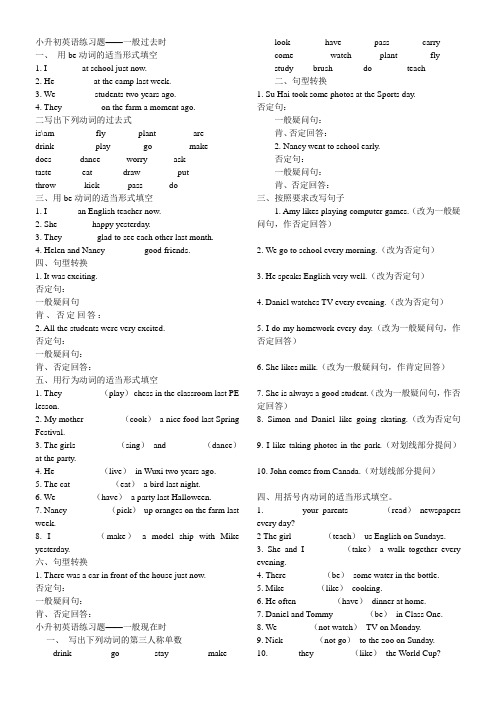
小升初英语练习题——一般过去时一、用be动词的适当形式填空1. I _______ at school just now.2. He ________ at the camp last week.3. We ________ students two years ago.4. They ________ on the farm a moment ago.二写出下列动词的过去式is\am_________ fly_______ plant________ are _____ drink_________ play_______ go________ make __ does______ dance______worry______ask _____taste_______eat_______draw________ put ______ throw______ kick______ pass______do ________三、用be动词的适当形式填空1. I ______ an English teacher now.2. She _______ happy yesterday.3. They _______ glad to see each other last month.4. Helen and Nancy ________ good friends.四、句型转换1. It was exciting.否定句:___________________________________一般疑问句________________________________肯、否定回答:______________________________ 2. All the students were very excited.否定句:___________________一般疑问句:________________________________ 肯、否定回答:______________________________五、用行为动词的适当形式填空1. They ________ (play)chess in the classroom last PE lesson.2. My mother _______ (cook)a nice food last Spring Festival.3. The girls ________ (sing)and _______ (dance)at the party.4. He _________ (live)in Wuxi two years ago.5. The cat ________ (eat)a bird last night.6. We _______ (have)a party last Halloween.7. Nancy ________ (pick)up oranges on the farm last week.8. I ________ (make) a model ship with Mike yesterday.六、句型转换1. There was a car in front of the house just now.否定句:__________________________________一般疑问句:______________________________肯、否定回答:_____________________________小升初英语练习题——一般现在时一、写出下列动词的第三人称单数drink ________ go _______ stay ________ make __look _______ have_______ pass_______ carrycome________ watch______ plant_______ flystudy____ brush_______do________teach_______二、句型转换1. Su Hai took some photos at the Sports day.否定句:________________________________ 一般疑问句:___________________________肯、否定回答:______________________________2. Nancy went to school early.否定句:__________________________________ 一般疑问句:______________________________ 肯、否定回答:_____________________________三、按照要求改写句子1. Amy likes playing computer games.(改为一般疑问句,作否定回答)_____________________________2. We go to school every morning.(改为否定句)_________________________________________ 3. He speaks English very well.(改为否定句)________________________________________ 4. Daniel watches TV every evening.(改为否定句)__________________________________________ 5. I do my homework every day.(改为一般疑问句,作否定回答)____________________________________6. She likes milk.(改为一般疑问句,作肯定回答)__________________________________________7. She is always a good student.(改为一般疑问句,作否定回答)___________________________________ 8. Simon and Daniel like going skating.(改为否定句___________________________________________ 9. I like taking photos in the park.(对划线部分提问)__________________________________________ 10. John comes from Canada.(对划线部分提问)__________________________________________四、用括号内动词的适当形式填空。
小升初英语专题习题-四大时态易错专项 译林版(word,含答案)
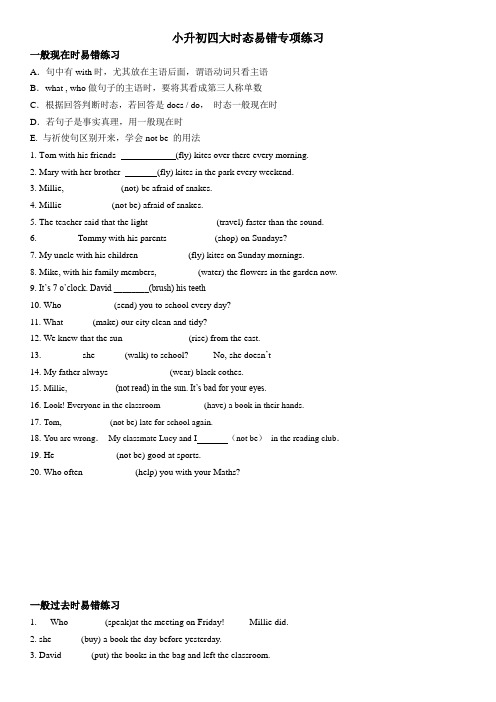
小升初四大时态易错专项练习一般现在时易错练习A.句中有with时,尤其放在主语后面,谓语动词只看主语B.what , who做句子的主语时,要将其看成第三人称单数C.根据回答判断时态,若回答是does / do,时态一般现在时D.若句子是事实真理,用一般现在时E. 与祈使句区别开来,学会not be 的用法1. Tom with his friends (fly) kites over there every morning.2. Mary with her brother (fly) kites in the park every weekend.3. Millie, ____________(not) be afraid of snakes.4. Millie___________(not be) afraid of snakes.5. The teacher said that the light _____________(travel) faster than the sound.6. ________ Tommy with his parents __________(shop) on Sundays?7. My uncle with his children___________(fly) kites on Sunday mornings.8. Mike, with his family members, ________ (water) the flowers in the garden now.9. It’s 7 o’clock. David ________(brush) his teeth10. Who ___________(send) you to school every day?11. What ______(make) our city clean and tidy?12. We knew that the sun ______________(rise) from the east.13. --- ______she ______(walk) to school? --- No, she doesn’t14. My father always _____________(wear) black cothes.15. Millie, __________ (not read) in the sun. It’s bad for your eyes.16. Look! Everyone in the classroom _________ (have) a book in their hands.17. Tom, __________ (not be) late for school again.18. You are wrong.My classmate Lucy and I(not be)in the reading club.19. He _____________(not be) good at sports.20. Who often ___________(help) you with your Maths?一般过去时易错练习1. --- Who _______ (speak)at the meeting on Friday! --- Millie did.2. she ______(buy) a book the day before yesterday.3. David ______(put) the books in the bag and left the classroom.4. She __________(think) that she was late for school.5. ______ Tom __________(ride) to school yesterday?6. Who _____________(teach) you English last year?7. My parents _____________(buy) me a new bike as my birthday present last week.8. Who ______________(teach) you to ride a bike when you were a child?9. Millie ________________(not do) homework yesterday.10. My father read a book in the room, and I _____________(do) my homework in the study.11. At last, I _______________(come) home at 10:00 P M.12. My father ______________(take) this photo in Japan about two years ago.13. Tom _______________(not write) a letter to his parents yesterday evening.14. My cousin ____________(put) up a tent near a lake 10 minutes ago.15. Lucy _____________(go) to the City Museum last Sunday.16. My friend, Carol, _________________(study) for the math test last night.17. She _________(stay) at home and ____________(do) some cleaning after she came back from work.18. She _______________ (not visit) her aunt last weekend.19. ________ she __________ (practice) her guitar yesterday?20. I _____________(have) an exciting party last weekend.一般将来时易错练习A. there be的一般将来时:there will be / there is are/ going to be;注意不能出现have一词B. in + 一段时间:in 3 hours; in 2 days等用将来时C. 根据回答来使用will或者be going toD. if 表达如果,主将从现1. My father ___________(go) to Shanghai next week, won’t he?2. She ______________(come) back to HK in 3 days.3. __________Lily _________ (play) with her friends tomorrow? No, she isn’t.4. _______there ________ (be) two football matches in two weeks, aren’t there?5. --Who________ (teach) you maths? ---- Mr Wang will.6. The members of Running Man_______________ (arrive)at the airport in half an hour.7. There ____________(be) a football match tomorrow.8. --- ________ there ________(be) a football match tomorrow? ---- Yes, there will.9. My father _____________(go) to Shanghai next week.10. __________ we meet at the school gate tomorrow?11. We’ll go to the park if it_____ rain tomorrow.A. don’tB. doesn’tC. won’tD. isn’t12. — If my uncle_______ next weekend, we_______ with him. — Sounds great!A. will come; will go skiingB. will come; goes skiingC. comes; will go skiingD. comes; goes ski13. —What will you do if it _______ tomorrow?14.—I will stay at home and watch the match on TV.A. rainB. rainsC. will rainD. is raining15. I’m sorry I’m very bus y now. If I ______ time, I ______ come to see you.A. have, wouldB. had, willC. were, willD. have, will16. James with the Greens _______ the White Tower Park if it_______ tomorrow.A. are go ing to; isn’t rainyB. are going to; does n’t rainC. is go ing to ; won’t rainD. is going to; isn’t rainy17. --- There ____________a bird show this afternoon. Shall we go to the zoo to watch it? --- Good idea.A. will haveB.is going to haveC. will beD. is going to18. --- Will there ________ a volleyball match on Sunday?--- Yes. There __________ two volleyball matches on that day.A. be; are going to beB. have; are going to beC. have; are going to haveD. be; are going to have19. There _________ a "helping ha nds” meeting this Sunday morning.A. is; atB. will be; atC.is going to be; /D. is going to have; on20. --- There _____________ a parents' meeting on Tuesday afternoon, isn't there?--- Yes. But my parents don't have time for it.A. will haveB. will beC. is going to haveD. is going to be现在进行时易错练习A. have作为有的意思来讲时,没有进行时。
小升初英语四大时态复习讲解及真题专项练习含答案
小升初英语四大时态复习讲解及真题专项练习含答案一、重点讲解考点一:动词的基本形式1.动词原形(分实义动词、助动词、系动词、情态动词4类)(1)助动词(do/does/did)紧随其后的动词用原形;(2)情态动词(can/could/should/must/would/will/shall/maybe)紧随其后的动词用原形;(3)祈使句(表示命令式的语句)用原形;Eg: Open the door, please.(4)固定搭配。
let sb do sth/help sb do sth/make sb do sth/why not do sth.2.第三人称单数(用于一般现在时)变形规则:(1)一般在动词词尾加s。
如: work→works、read→reads、look →looks、live→lives。
(2)以ch、sh、s、x结尾的,在词尾加es。
如: catch→catches、finish→finishes、guess→guesses、。
(3)以o结尾的动词,分2种情况:有生命的加es,如:hero,tomato,potato;没有生命的加s,如:radio,photo。
(4)以辅音字母加y结尾的动词,变y为ies。
如: fly→flies、study →studies、carry→carries.(5) 不规则变化。
如: have→has ,are→is,were→was3.现在分词(用于现在进行时)变形规则:(1)一般在动词后加ing。
如: work→working、read→reading、look →looking、wait→waiting。
(2)以不发音的e结尾的动词,去掉e,再加ing。
如: smile→smiling、move→moving、take→taking、write→writing。
(3)以重读闭音节结尾的且词尾只有一个辅音字母的,双写这个辅音字母加ing。
如: sit→sitting、stop→stopping、cut→cutting、run →running、swim→swimming.(4)少数几个以ie结尾的动词,将ie改为y加ing。
word完整版小升初四大时态及习题
.英语四大时态总复习一般现在时一、一般现在时的形式以及定义二、一般现在时的基本用法1. 表示事物的性质、特征以及经常性的行为,常与always, often, usually, every day等词连用。
Tom usually comes to school late. Tom 经常上学迟到。
2. 表示客观事实和普遍真理。
The sun rises in the east. 太阳从东方升起。
3. 用在格言、谚语中。
No pains, no gains.不劳而获。
一般过去时一、一般过去时的定义以及形式..二、一般过去时的基本用法与常态,存作或在的状间表示在过去的时里发生的动1.等连用。
yesterday, last night, several years ago I took a bus to school last Friday.上周五我坐公交车去上学。
2. 表示在过去的某段时间里,经常或反复发生的动作或状态。
他们去年经常晚饭They had a walk after supper last year.后散步。
一般将来时一、一般将来时的定语以及形式二、一般将来时的基本用法常与将来的时间状语1. 表示将来某个时间要发生的动作或状态,tomorrow, next week等连用。
..She will be back tomorrow.她明天就回来。
2. 表示将来某一时间内经常发生的动作或状态。
We'll have a test every Monday this year. 今年的每一个周一我们都有考试。
巧学妙计Be going to 指当前已计划过或思考过的意图和打算;will/shall 表示未事先思考或未计划的意图。
Be going to 还可以表明马上要发生,而will则表明说话者的观点、主观意识。
I'm going to visit mu aunt this week. 我打算这周去看望姑姑。
小升初四种时态习题
一般过去时用法:①过去发生的动作;②过去存在的状态。
一般过去时中,动词过去式的构成规则1. 一般情况下,直接加ed。
如:visit---visited2. 以不发音的e结尾,加d。
如:live---lived3. 以辅音字母+y结尾,把y改成i,加ed。
如:study---studied4. 以元音字母+y结尾,直接加ed。
如:play---played5. 重读闭音节结尾的词,双写末尾字母加ed。
如:stop---stopped6. 不规则变化,如:go---went否定句:主语+didn’t+动词原形+其他主语+wasn’t/weren’t+其他如:I didn’t go to the park yesterday.They weren’t free yesterday.一般疑问句:Did+主语+动词原形+其他Was/Were+主语+其他如:Did you go to the park yesterday?Yes,I did./No,I didn’t.Were they free yesterd ay?Yes,they were./No,they weren’t.特殊疑问句:疑问词+一般疑问句如:What did you see in the zoo?Who were at home last night?常用时间状语: yesterday,three months ago,last week/year,in 1990例句:He always went to work by bus last year.Han Meimei was in the classroom a moment ago.When did you meet him?轻松试一下一.写出下列不规则动词的过去式。
am,is keep are let become make begin meet bite put blow read buy cost catch run come say ride see cut sing dig sitdo sleep draw speak drink sweep eat take fall teach feed tell feel think fly throw forget understand get givewake go wear knowwin have/has write grow二.用动词的适当形式填空。
(完整版)小升初英语总复习----四种时态专项训练(精编)
四种时态专项训练1.一般现在时:注意点①主语为第三人称单数()动词用②主语为第三人称单数时动词变化规则直接+s:+es(以)结尾:-y变i+es:(以字母+y结尾):补充:元音字母:③句型转换否定句:句子中有be 动词,直接在后面加句子中没有be动词,需要加,主语是第三人称单数用助动词一般疑问句:有be动词,没有be动词,2现在进行时注意点①基本结构:主语+②标志词:(句子中出现这些单词,一定要用现在进行时)③动词变现在分词的变化规则直接+ing:以“e”结尾的动词,去e+ing:以重读闭音节结尾,双写末尾字母后加ing:闭音节:含一个元音字母,但以辅音字母结尾④句型转换否定句:在be动词面,加not一般疑问句:把提到最前面,句子动词用特殊疑问句:例题:Miss Li is looking for her pen①②对①进行提问:对②进行提问:3一般过去时:注意点④句型转换否定句:主语+ (没有be动词)主语+ (有be动词)一般疑问句:以开头(没有be动词)以开头(有be动词)特殊疑问句:特殊疑问词+ + + ?(没有be动词)例题翻译:你家过去在哪里?4,一般将来时注意点①基本结构:主语+②标志词:next+年,月,日③句型转换:否定句:在be动词面加not他下周打算去公园吗?(一般疑问句)他下周打算去哪里?(特殊疑问句)④翻译:下周它将会是:_________ did you ________ the birds?2. Then, he let the boy go.(改为否定句)Then,he _______ ________ the boy go.3. They could play football.(改为一般疑问句,并作肯定回答)----________ they play football? ----Yes, they _________.4. Nancy lives in Nanjing now.(用last year 改写句子)Nancy _______ in Nanjing last year.5.I went to a shopping centre last Sunday.(改为一般疑问句,并作否定回答)---______ you ______ to a shopping centre last Sunday? ---No, I _________.6. He puts his things in order. (改为一般疑问句)___________________________________________________7. Did you go to bed late last night? (改为陈述句)____________________________________________________8. They often do their homework in the evening. (用she替换they)____________________________________________________9. You should put your books and toys on the floor. (改为否定句)_____________________________________________________10. He feels sleepy in the morning. (对划线部分提问)____________________________________________________11. This is Bobby’s bedroom. (对划线部分提问)____________________________________________________12. have, my, time, breakfast, I, always, on (.) (连词成句)____________________________________________________.13. The, out, the, get, lion, mouse, helped (.) (连词成句)____________________________________________________. 14. A monkey woke the tiger up.(改成一般疑问句)__________________________________________________15. Sam brings some water.(改成否定句)__________________________________________________16. Mike has some bread and milk for breakfast. (对划线部分提问)__________________________________________________17. The man sings well. (对划线部分提问)18. too, you, cola, much, drink, shouldn’t (.) (连词成句)______________________________________________________20 The children must play football on the road.(改为否定句)______________________________________________________ 21. We must look out for the traffic lights first.(对划线部分提问)______________________________________________________ 22. An old woman is crossing the road.(对划线部分提问)______________________________________________________ 23. You can’t watch TV now because it’s late. (对划线部分提问)______________________________________________________ 24. keep, desk, tidy, I, must, my, clean, and (.)(连词成句)______________________________________________________二用所给词的适当形式填空1.Let (we )(play) basketball this afternoon.2. (Be)your sister (visit) your parents tomorrow?3.Yang Ling is going to (make) clothes for her dolls.4. (child) Day is on the first of June.5. Tim usually (brush) his teeth in the morning.6.I (have) a birthday party last year.7.Tomorrow is Dragon Boat Festival. We (watch )a dragon boat race.8. They (eat) moon cakes last Mid-Autumn Festival?9.My parents ( watch) TV in the living room now.10. Your birthdayis coming. I (make) a cake for you.11.Let’s(play) the piano together.12.How many ( visit) are there in your group?13.My sister wants ( learn) about in England.14.My uncle is from ( Chinese).15.Animal ( love) will go to see them quickly.16.Jack (go )and look for his parents next week.17. (visit) from the US are very friendly.18.The girls ( learn) an English song next week.19.The students are very (excite).Because the game is very (e xcite).20.My mother likes ( listen)to music after dinner.21.He ( read) a book last night.22.Lucy is going to ( find) a book about e- cards.23.I (eat) some bread for breakfast yesterday.24.Can I ( have) an English book?25.We (are) twelve years old last year.26.I want (buy )a computer.27.What ( be) your parents going to do this weekend?28.We (fly) kites tomorrow.29.The boy ( come) to my house the day after tomorrow.30.What about (go )for a picnic next week?31. Mary’s birthday is next Monday, her mother (give) her a present.32.My mother ( buy) some snacks and drinks this morning.33. (Be) your family going to climb the hill next Sunday?34.Now, Bobby ( wear) his new clothes.35.This lesson (end) at half past eleven. Then you can have lunch.35. It is very cold these days . It (snow) tomorrow.36.-- You ( come here again next Saturday?---No. I (visit) my teacher.37.Hurry up! or we (be )late.38.--What you ( do) tomorrow afternoon?--I (see )a film with my friend.39.---Can you come and ( help )me with my English ,mum?。
- 1、下载文档前请自行甄别文档内容的完整性,平台不提供额外的编辑、内容补充、找答案等附加服务。
- 2、"仅部分预览"的文档,不可在线预览部分如存在完整性等问题,可反馈申请退款(可完整预览的文档不适用该条件!)。
- 3、如文档侵犯您的权益,请联系客服反馈,我们会尽快为您处理(人工客服工作时间:9:00-18:30)。
.英语四大时态总复习一般现在时一、一般现在时的形式以及定义二、一般现在时的基本用法1. 表示事物的性质、特征以及经常性的行为,常与always, often, usually, every day等词连用。
Tom usually comes to school late. Tom 经常上学迟到。
2. 表示客观事实和普遍真理。
The sun rises in the east. 太阳从东方升起。
3. 用在格言、谚语中。
No pains, no gains.不劳而获。
一般过去时一、一般过去时的定义以及形式..二、一般过去时的基本用法与常态,存作或在的状间表示在过去的时里发生的动1.等连用。
yesterday, last night, several years ago I took a bus to school last Friday.上周五我坐公交车去上学。
2. 表示在过去的某段时间里,经常或反复发生的动作或状态。
他们去年经常晚饭They had a walk after supper last year.后散步。
一般将来时一、一般将来时的定语以及形式二、一般将来时的基本用法常与将来的时间状语1. 表示将来某个时间要发生的动作或状态,tomorrow, next week等连用。
..She will be back tomorrow.她明天就回来。
2. 表示将来某一时间内经常发生的动作或状态。
We'll have a test every Monday this year. 今年的每一个周一我们都有考试。
巧学妙计Be going to 指当前已计划过或思考过的意图和打算;will/shall 表示未事先思考或未计划的意图。
Be going to 还可以表明马上要发生,而will则表明说话者的观点、主观意识。
I'm going to visit mu aunt this week. 我打算这周去看望姑姑。
(事先经过思考)I'll open the door. 我去开门。
(未经事先考虑)现在进行时一、现在进行时的定义以及形式二、现在进行时的基本用法连用。
now, today1.表示此时此刻正在发生或进行的动作,常与'It s raining hard now.正在下大雨。
this month, this week表示现在一段时间内进行的动作,常与2.等连用。
..The farmers are working hard these days. 这些天农民工们工作很忙。
3.现在进行时可表将来的动作。
They're seeing me next week. 他们下周来看我。
巧学妙计See, come, go, leave, start, begin 等词可用现在进行时表示表将来的意义。
不规则的动词过去式。
(1)不变cut hurt hit let putread(放)(受伤)(打)(剪)(让)(读)(2)改i为o drive-drove ride-rode (骑)(开车)rise-rose write-wrote win-won (赢)(升起)(写)(3)该i为abegin-begandrink-drank sit-sat (坐)(喝)(开始)give-gave sing-sang swim-swam(游(唱歌)(给)泳)(4)改为aught catch-caught teach-taught (抓住)(教)(5)改为oughtbuy-boughtbring-brought (带来)(买)think-thought(思考)(6)改eep为ept sleep-slept sweep-swept (打扫)(睡觉)keep-kept (保持)(7)改a/ow为ew blow-blew know-knew(知道)(吹)throw-threw draw-drew (画画)(扔)..(8)其它形式am/is-was are-were come-came (来)(是)(是)do-did eat-ate fall-fell find-found(找到)(做)(落下)(吃)feel-felt get-got forget-forgotgo-went(得到)(感觉)(忘记)(去)have-had hear-heard lose-lost meet-met(丢失)(听)(有)(见面)make-made run-ran say-said see-saw(看(制造)(说)(跑步)sell-sold send-sent speak-spoke (讲)(卖)见)(寄)take-tooktell-told wake-woke(醒)(带走)(告诉)六年级英语复习资料(一)——句式变换一、把一般现在时改为过去时。
(1)①I am a student.(be动词) am/ is/ are——was/were改______________________________________________________________________②He is a doctor.______________________________________________________________________③She is a teacher.______________________________________________________________________④They are my friends.______________________________________________________________________(2)①Tom goes to school by bike.(改动词)______________________________________________________________________②I like mangoes...______________________________________________________________________③They play basketball.______________________________________________________________________二、把一般现在时改为现在进行时。
(现在进行时:be+Ving)1)I go to the park._____________________________________________________________________2)They listen to the radio._____________________________________________________________________3)She does her homework._____________________________________________________________________三、把一般现在时改为一般将来时。
(将来时:be going to/will+V原)1)I go to the park._____________________________________________________________________2)They watch TV every day._____________________________________________________________________3)Jenny sings a song ._____________________________________________________________________按要求改写成相对应的时态。
.四1)I buy a can of cola.①____________________________________________(一般过去时)②____________________________________________(现在进行时)③____________________________________________(一般将来时)2)She washed face yesterday.①____________________________________________(一般现在时)..②____________________________________________(现在进行时)③____________________________________________(一般将来时) 3)They are visiting their relatives.①____________________________________________(一般现在时)②____________________________________________(现在过去时)③____________________________________________(一般将来时) 4)Tom and Ben are going to go to Beijing.①____________________________________________(一般现在时)②____________________________________________(一般过去时)③____________________________________________(现在进行时) .。
